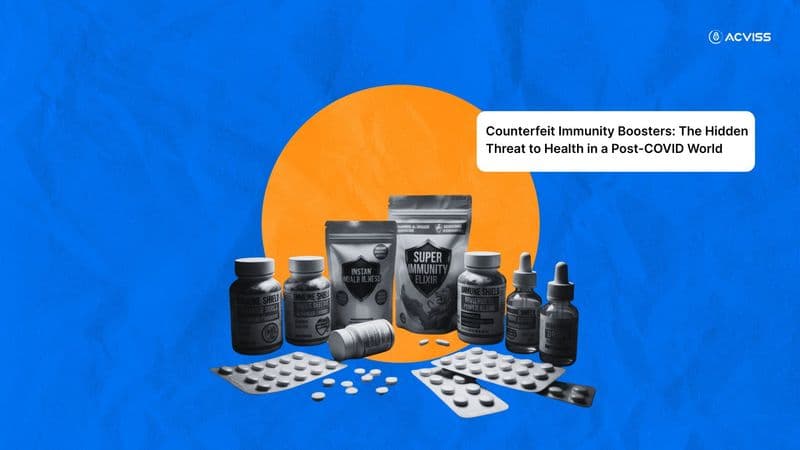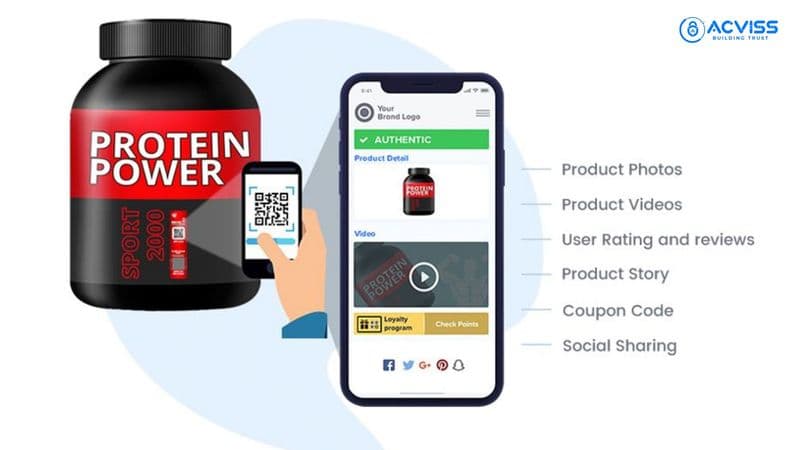Counterfeit Immunity Boosters: The Hidden Threat to Health in a Post-COVID World

In the wake of COVID-19, "immunity boosters" became the ultimate buzzword. With a global pandemic at our doorstep, health and hygiene took centre stage. While vaccines were still under development, people turned to preventive measures, and building immunity became a trending priority. For brands, this was an opportunity to capitalize on market demand, leading to a surge in products labelled as "immunity boosters."
Counterfeit Immunity Boosters: A Crisis in Wellness
Unfortunately, the rapid rise in demand brought with it a darker side: counterfeit immunity boosters infiltrating the market. These fake products not only fail to deliver on their promises but can also pose significant health risks to consumers.
Five Reasons Counterfeit Immunity Boosters Thrive
1. Changing Market Dynamics
- Immunity is no longer solely about natural remedies and home-cooked meals. Today, the market is flooded with products like micro foods, protein shakes, and meal replacement supplements marketed as immunity-boosting solutions. Their convenience and taste make them appealing, but also lucrative targets for counterfeiters.
- As these supplements become daily staples, their high demand creates opportunities for counterfeit products to infiltrate the market.
2. The Quick-Fix Mentality
- Busy lifestyles drive people to seek easy solutions for health concerns. Immunity boosters promise quick benefits, making them attractive to consumers.
- Counterfeiters exploit this by using harmful additives like steroids to mimic fast results, leaving consumers vulnerable to serious side effects. With so many new brands entering the market, identifying genuine products becomes a challenge.
3. Lack of Regulatory Oversight
- In India, the Food Safety and Standards Authority of India (FSSAI) does not verify every product’s marketing claims, leaving gaps for counterfeiters to exploit.
- While regulations help reduce dangerous foods, they often fail to address misleading claims or packaging, giving counterfeit products a free pass to enter the market.
4. Online Sales and e-Pharmacies
- E-commerce platforms and online pharmacies provide counterfeiters with easy access to unsuspecting buyers.
- Unregulated third-party sellers and contaminated supplements lead to significant risks for consumers, tarnishing the reputation of legitimate brands.
5. COVID-19 Panic Buying
- During the pandemic, a shortage of medicines drove people to hoard dietary supplements for perceived protection against COVID-19.
- This sudden demand, coupled with disrupted supply chains during lockdowns, created a perfect storm for counterfeit immunity boosters to flood the market.
The Risks of Counterfeit Immunity Boosters

Counterfeit immunity boosters and supplements pose serious risks to consumers:
- Adulteration with harmful chemicals: Fake products often include steroids or other dangerous additives, leading to potential health complications.
- Loss of trust: Consumers who buy counterfeit products may lose faith in legitimate brands.
- Ineffectiveness: Counterfeit products fail to deliver the promised benefits, undermining their purpose of strengthening immunity.
Must Read: How to check Amazon sold products original or not?
The Role of Anti-Counterfeit Technology

To combat counterfeit immunity boosters, brands must take proactive steps to secure their supply chains and protect consumers. Modern anti-counterfeit technologies can play a critical role, including:
Overt and Covert Markers
- Use visible and hidden markers on packaging to ensure product authenticity.
Track-and-Trace Systems
- Implement serialization and blockchain-based tracking to monitor a product’s journey across the supply chain.
Tamper-Proof Packaging
- Develop packaging that prevents contamination and ensures product safety.
Consumer Awareness Tools
- Educate consumers about verifying product authenticity using QR codes or mobile apps.
- Educate consumers about verifying product authenticity using QR codes or mobile apps.
Brands as Guardians of Public Health
The responsibility to fight counterfeit products lies not only with regulators but also with brands. By employing advanced anti-counterfeit technology, building consumer awareness, and ensuring strict quality control, brands can safeguard public health and restore trust in the immunity booster market.
FAQs
What are immunity boosters?
Immunity boosters are foods, supplements, or products designed to strengthen the immune system, helping the body fight illnesses and maintain overall health.Why are counterfeit immunity boosters dangerous?
Counterfeit immunity boosters often contain harmful additives like steroids or contaminated ingredients, leading to serious health risks and undermining the product’s effectiveness.How can I identify fake immunity booster products?
Look for:- Official authentication features like QR codes or holograms.
- Proper labelling with verified claims and no spelling errors.
- Trusted sources or verified retailers.
What role does technology play in fighting counterfeit products?
Technology like serialization, blockchain, and tamper-proof packaging ensure product authenticity and secure the supply chain, protecting consumers from fake goods.How do counterfeit immunity boosters impact brands?
Counterfeit products harm brand reputation, reduce consumer trust, and result in financial losses due to diverted sales and potential legal liabilities.What are the long-term effects of consuming counterfeit immunity boosters?
Consuming counterfeit immunity boosters can lead to severe health issues, including organ damage from harmful additives like steroids or heavy metals. Over time, these products may weaken the immune system rather than strengthen it, leaving the body more vulnerable to diseases and infections. Additionally, prolonged use of adulterated supplements can cause chronic health conditions.
